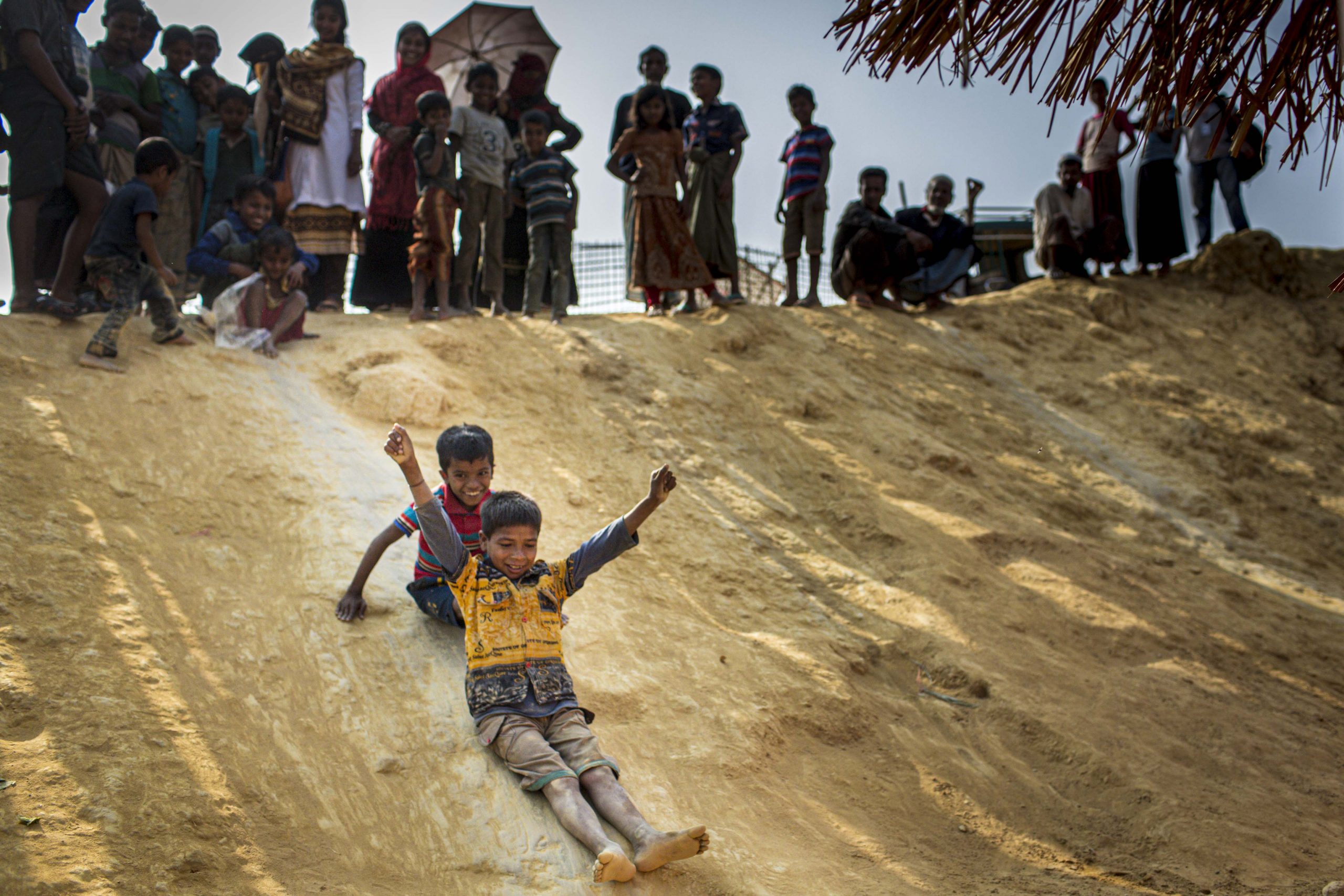By Nancy Richards Farese
Originally published in the Mercury News on May 9, 2025
Kids understand what adults have forgotten, that play is not frivolous, that it is survival and that it heals.
I’ve spent the past 15 years photographing children at play in some of the hardest places on Earth: post-disaster Haiti, refugee camps in the Middle East, war-scarred landscapes from Palestine to Bangladesh. Again and again, I’ve witnessed something extraordinary: after crisis, children don’t just seek shelter or food. They seek out each other. They play.
They turn broken objects into toys. They invent rules. They argue, adapt, laugh, try again. They create temporary worlds governed by shared understanding and mutual delight. And they do it instinctively, without direction, without fear.
It took time to see what was really happening. This wasn’t just resilience. It wasn’t escape. Something in these kids understands what many adults have forgotten—that play is not frivolous. It’s survival. It’s repair. Children know instinctively that play heals.
We talk about play as if it belongs only to childhood, or worse, as if it’s frivolous. But play is how we first learn to take care of ourselves and live with other people. It is our earliest education in empathy, in fairness, in cooperation. In a society where trust is fracturing, polarization is intensifying, and conflict is increasingly zero-sum, it might just be the civic training we’re missing most.
Why Democracy Needs Play
Democracy is not just a structure—it’s a behavior. A muscle. And like any muscle, it atrophies without use.
In unstructured play, children learn skills that democracy depends on but schools struggle to teach: how to negotiate, how to pick a leader, how to adapt rules that no longer serve the group. They experience justice and injustice, freedom and constraint. They test power. They improvise. And importantly, they do this with other human beings in real time—not through screens, not through abstraction.
These are not soft skills. They are survival skills for pluralism. Free play is a low-stakes way to train to live in a democracy.
And yet, the places where this kind of play happens—schoolyards, neighborhoods, public spaces—are disappearing or over-regulated. Free play is increasingly replaced with screen time, structured programs, and anxious oversight. We’re raising a generation of children who are rarely allowed to solve their own problems or co-create their own social worlds. We’ve prioritized safety over sovereignty.
But democracy is not safe. It’s messy, demanding, and full of disagreement. That’s why it needs citizens who have rehearsed those conditions—and who still know how to trust, imagine, and rebuild.
Adults Need This, Too
It’s not just kids who suffer from the loss of play. Adults are starving for it, too.
Play is where we learn flexibility, tolerate ambiguity, and practice creative risk. These aren’t just personal virtues—they’re democratic ones. They’re what allow us to coexist with people who think differently, to engage without vilifying, to be curious instead of reactive.
Without play, we fall back on rigidity, certainty, tribalism. We mistake heated performance for constructive participation. And in the process, civic life becomes brittle—no longer a space for improvisation or empathy, but for spectacle and scorekeeping.
What would it mean if we treated collective joy not as a distraction, but as a civic resource? What if play was as essential to public life as voting, protesting, or debate?
We need collective joy. Imagine if play wasn’t something you “earned,” but something you owed yourself and your community. Imagine if we treated it as essential as sleep or nutrition. A practice to maintain our sanity. A muscle to keep our society elastic.
Imagine cities that prioritized playful infrastructure—public art, open-ended spaces, games that require strangers to cooperate. Imagine political movements that centered joy instead of outrage. Imagine reclaiming adulthood not through work or wealth, but through wonder.
The Civic Genius of Children
Children in refugee camps have shown me something American democracy desperately needs to remember: play is a social glue. Play builds capacity for life in community. It’s where we practice power-sharing. Where we learn that fairness isn’t given, but forged together. Where we discover that even chaos can contain progress and growth, if we’re willing to listen, adjust and bias towards justice.
Play is a mindset. We already know how to do it, and it is completely free. When children play, they aren’t just passing time. They are training to be adults in families, citizens of communities, and shapers of nations. And when adults play, we remember what it means to be resilient, not just as individuals, but as a body politic. We also remember the importance of joy and wellbeing in our everyday lives.
If we want to raise democratic people, we need more than civics classes. We need free play at recess. We need room for spontaneity, for argument, for laughter.
We need play.
Farese’s photos are on display in the Potential Space exhibit until June 8, 2025.

